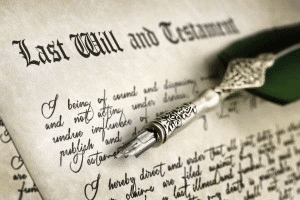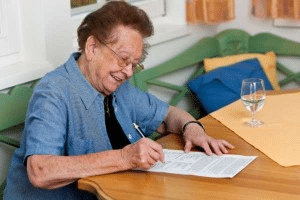When it comes to the unfortunate fact of human mortality, it’s easy to say, “I’ll cross that bridge when I get there.” This might be the right attitude. Enjoy life – aside from treating your mind, your body, and your loved ones well, there’s little you can do to affect those final moments. When you come to that bridge, you will cross it.
Download Our Free Estate Planning Guide
But what about the people you leave behind?
Your dependents, other relatives, and friends will suffer when you pass away. There will be the emotional impact of the loss, of course, but there are many ways that death can cause distress beyond the unavoidable pang of absence. If you’ve become incapacitated, who will make important medical decisions for you? Who will care for your dependents after you’ve gone? How will your debts and assets be divided? Who gets your house, your investments, your treasured possessions? Who will make these decisions where your wishes aren’t clear? While there’s no getting around the pain your passing will cause the ones you love, you can take steps today to minimize stress and confusion when it comes time for you to leave your loved ones, and to provide for them when you’re gone. Knowing that you’ve done this will give you peace of mind today.
Estate Planning: Beyond the Will
 For many people, “estate planning” is synonymous with writing a will. Writing a will might be the most important part of estate planning and the first concern on your mind, but there are other things to consider. Estate planning is a broad term for the many ways of preparing, legally, for death, and especially the distribution of property and other assets. It also can encompass planning for any physical or mental incapacity you may experience while still alive. Depending upon your needs and circumstances, proper estate planning could involve much more than writing a will. A Buffalo estate planning lawyer could help you:
For many people, “estate planning” is synonymous with writing a will. Writing a will might be the most important part of estate planning and the first concern on your mind, but there are other things to consider. Estate planning is a broad term for the many ways of preparing, legally, for death, and especially the distribution of property and other assets. It also can encompass planning for any physical or mental incapacity you may experience while still alive. Depending upon your needs and circumstances, proper estate planning could involve much more than writing a will. A Buffalo estate planning lawyer could help you:
- Set up and administer a trust.
- Establish power of attorney or a healthcare proxy.
- Review a life insurance
- Name a conservator for your affairs or a guardian for your children.
- Guide your will through probate after you’re deceased.
- Keep certain assets out of probate.
- Help you (and your beneficiaries) to avoid estate taxes.
You might believe you don’t need an estate plan because you don’t have a lot of property. But estate planning isn’t about which relative gets the vacation house or which child gets the classic car. Even if you don’t think you have many valuable assets, you should still consult a Buffalo estate planning lawyer. You probably have more worth dividing than you realize. For example, if you have young children or grandchildren, whether or not you have much to leave them now, an attorney could help you place investments in a trust to be released to your descendants when they – and your investments – have matured. Estate planning isn’t all about money and assets, either. With an estate plan, you can decide what happens if you become incapacitated and unable to make certain decisions about your medical care, family, and legal obligations, as well as your finances and assets.
Summary:
- Writing a will is not the only component of estate planning. Estate planning is about leaving behind a legacy.
Estate Planning Essentials
 What you need, and need to plan for, depends on the number, diversity, and value of your assets; on your debts; and on your family situation. However, there are certain basics of estate planning that everyone should dispatch early on. At the very least, you will probably need a last will and testament to make your wishes clear, a healthcare proxy to make medical decisions if you are incapable of doing so, and someone with power of attorney to do the same for your legal affairs.
What you need, and need to plan for, depends on the number, diversity, and value of your assets; on your debts; and on your family situation. However, there are certain basics of estate planning that everyone should dispatch early on. At the very least, you will probably need a last will and testament to make your wishes clear, a healthcare proxy to make medical decisions if you are incapable of doing so, and someone with power of attorney to do the same for your legal affairs.
You might have other concerns beyond these basics. You might be worried about what will happen to your home and assets if you move into an assisted living facility. You might be concerned about paying for your long-term care. Finally, if you’re a high net worth individual, you might be concerned about estate taxes.
Summary:
- The very basic essentials of estate planning are a last will and testament, a healthcare proxy and a power of attorney.
Important Documents
 There are many legal documents you can use to create your estate plan – you’ve probably heard of a few. Some of the more common documents or legal devices used in Buffalo, New York for estate planning purposes include:
There are many legal documents you can use to create your estate plan – you’ve probably heard of a few. Some of the more common documents or legal devices used in Buffalo, New York for estate planning purposes include:
Will: A will is a legal document that sets out how you want to distribute your assets after you die.
Living Will: A living will, sometimes referred to as a document directing health care or an advanced healthcare directive, sets forth the medical care you are to receive and under what circumstances, should you be unable to communicate those decisions yourself.
Health Care Proxy: A health care proxy identifies the person you want to make your medical decisions for you in case you become incapacitated.
Trust: A trust is an arrangement where someone (the trustee) controls property for the benefit of another person (the beneficiary). One of the biggest advantages of having a trust is that it can keep your property out of probate court.
Power of Attorney: The purpose of a power of attorney is straightforward – to give someone the authority to handle certain legal matters for you, such as financial affairs. The power of attorney can set out limited tasks for another person to handle or it can be very broad, essentially allowing someone else to do anything you would be able to do.
Life Insurance: Life insurance works by having an insurance company pay out a sum of money to a beneficiary when the individual insured under the policy dies. In return for this promise, the insurance company receives regular payments in the form of premiums.
Summary:
The documents involved in estate planning are a will, a living will, a healthcare proxy, a trust, a power of attorney and life insurance.
Buffalo Estate Planning Lawyer
If you or somebody you love requires the services of a dedicated and experienced Buffalo estate planning lawyer, please contact Thomas Hewner at Cole, Sorrentino, Gambino, Hurley & Hewner to get the legal counsel you require. If you need further guidance, review our New York Estate Planning Guide.
Download Our Free Estate Planning Guide
